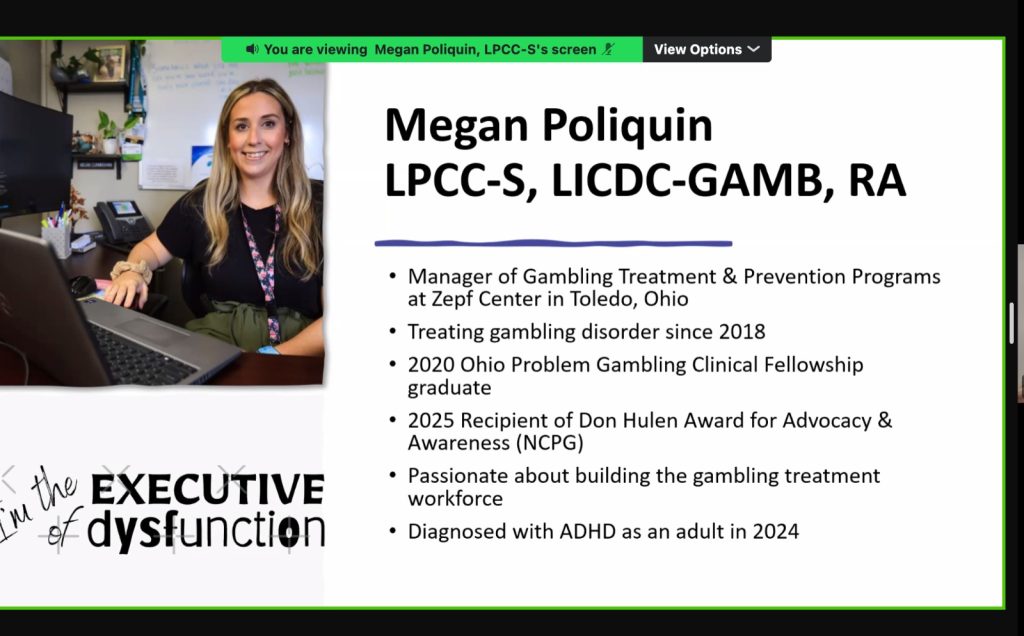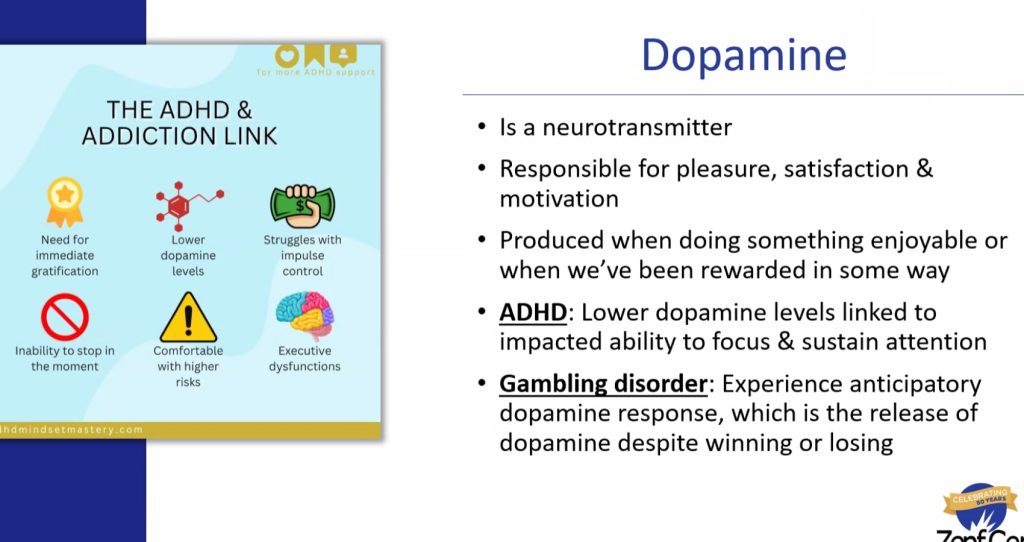Megan Poliquin has been treating people with gambling disorder since 2018. But her understanding of how it affects some people changed dramatically last year. She was diagnosed with Attention Deficit/Hyperactivity Disorder (ADHD), and that diagnosis elevated not only her understanding of how gambling disorder and ADHD interact, but also how to better treat it.
“For those of us with ADHD, it takes more energy to go the same length, or accomplish the same task, as someone who does not have ADHD,” Poliquin said. “It’s the amount of effort and energy to do things. … I might not have the energy to take care of myself or go to the gym, but binge-watching TV, eating crappy junk food, or gambling are low-energy activities that give you a hit of dopamine. You’re trying to do something to give yourself more motivation to do the harder ‘life tasks.’”
ADHD is just one of a long list of co-morbidities for gambling addiction, which wasn’t formally recognized in health care as an addiction until 2013. At that time, the Diagnostic and Statistic Manual of Mental Health (DSM-5) reclassified “pathological gambling” to “gambling disorder,” and included it in the “substance-related and addictive disorders” section.” The change was critical, as it opened pathways to treatment and insurance coverage.
Mental health professionals have long pointed to substance abuse, including alcoholism or drug abuse, as co-morbidities for gambling addiction. But anxiety disorders, depression, and PTSD are also frequent co-morbidities. Per a Georgia Department of Behavioral Health and Developmental Disabilities fact sheet, the likelihood that someone with gambling disorder has other issues “may be as high as 90%,” and those with gambling disorder have an average of 4.7 additional disorders.
A Lund University (Sweden) academic survey also revealed problematic shopping to be a problem gambling co-morbidity. In a survey of 2,038 online respondents, researchers determined that 5.7% “screened positive for lifetime problem gambling” and that “significant associations were found between problem gambling and male gender, education level, daily tobacco use, moderate psychological distress, problematic shopping, and problem gaming.”
Up to 20% with ADHD are addicted gamblers
Poliquin, manager of the gambling treatment and prevention programs at Ohio’s Zepf Center, is quick to point out that she is a therapist, not a researcher. She sees the co-morbidities — or in layman’s terms, additional addictions or conditions — in real life, and her goal is to help her clients manage them.

In a National Council on Problem Gambling webinar in August, Poliquin outlined the overlap between ADHD and gambling addiction, explaining how ADHD symptoms feed into gambling addiction and why. During the webinar, Poliquin shared research about the prevalence of ADHD in those with gambling disorder. Research suggests that up to 4.4% of the U.S. adults have ADHD, and as many as 10-20% of individuals with ADHD experience problem gambling.
Poliquin points to key areas of overlap:
- Individuals with ADHD often hyperfocus, and those experiencing gambling-related harm may display a preoccupation or hyperfocus with gambling.
- Individuals with ADHD can become easily distracted, and those who also have a gambling disorder may use gambling as an escape from life stressors.
- Problems with impulse control may be present for individuals with ADHD and individuals with gambling disorder.
- Individuals with ADHD may take unnecessary risks or be excitement-seekers. This kind of behavior is also seen in those with gambling disorder through chasing wins or losses.
- Both individuals with ADHD and those with gambling disorder experience the need for help from others, whether that is in the form of “being rescued” from life stressors or asking for financial bailouts related to problem gambling.
She’s quick to point out that research has proven “over and over again” that ADHD isn’t a weakness, it’s a “neurodevelopment condition that often involves dopamine deficiencies” that can be treated with medication and lifestyle changes.
“It’s not that you’re not disciplined enough, not working hard enough, it’s a chemical issue in your brain,” Poliquin said. “Living in recovery or with ADHD is just like living with any other medical condition, you have to learn and use the tools to manage your symptoms.”
Awareness key to managing issues
In her experience, Poliquin said, the best treatment to manage ADHD and gambling disorder is a holistic approach, but it’s not always a straight line for a client to go from thinking they have a problem to treating it. Some clients, she said, walk in the door understanding they have a gambling disorder and want tools to treat it. Others need more time and conversation to recognize that the problem gambling behaviors are a byproduct of something else, like ADHD. Either way, Poliquin said treating only the gambling disorder is a “disservice” and therapists and clients should dig deeper to find the root cause and related issues.

“Our responsibility is to inform the client of what they are being diagnosed for,” Poliquin said. “People can’t really go about fixing things without knowing what they are trying to fix.”
What makes gambling addiction bloom — in those with or without ADHD? It could be anything from struggling with PTSD to a job change to moving into a new house. The change could be positive or negative, but if it causes stress, especially for someone with ADHD, other addictions, like gambling, may be used as coping mechanisms.
Besides educating clients, Poliquin said a key part of treatment is taking preventative measures. If boredom is a trigger for gambling, Poliquin talks to her clients about making plans to stave off that boredom — especially in places where digital sports betting or iGaming are available. Since adult Americans can place a sports bet on their phone — and because sports are so ingrained in the culture — she works with clients on strategies that allow them to enjoy sports but keep the betting at bay.
“Sports are tough,” Poliquin said. “Sports are an American pastime. You don’t have to be a sports bettor to love sports. Sports betting can be really risky to engage in because it’s so widely accepted and normalized, and there is a level of camaraderie to it, it feels like everyone is doing it.”
ADHD just ‘feeds off’ sports betting
She said it’s easy for those struggling with gambling disorder to convince themselves they don’t have a problem if they’re in a group that bets. And it’s always possible to look around a room — especially at a sportsbook or sporting event — and convince yourself that someone else is worse off than you are.
“I’ll stop when I look like that guy. Or I’m not as bad as Joe Schmo over there,” Poliquin said a client might think. “When you have the ability to make bets before the game and even during the game, you are giving yourself consistent and constant dopamine hits. For someone with ADHD and problem gambling, that could be the perfect storm.”
The first step toward managing a wagering problem is identifying it. After that, Poliquin said, clients must own the problem and share it. As an example, she suggested going to watch a sporting event with friends and leaving funding methods at home, or telling friends that you don’t want to bet too much.
Legal sportsbooks offer suites of responsible gambling tools to keep bettors from overindulging. Bettors can place time and/or spending limits on their play and investment. They can self-exclude for short or long periods of time.
But ultimately, those with ADHD are faced with a unique challenge when it comes to gambling or sports betting. The need for the dopamine hit is easily satisfied by placing a bet, and it’s easy to keep going after it.
“ADHD just feeds off” sports betting, Poliquin said. “For clients that have identified problem gambling in their lives but aren’t ready or don’t want to fully stop gambling, harm reduction is an option. In therapy, we are always trying to meet the client where they are at and help them address their current goals.
“Harm reduction with gambling might look like setting up responsible gambling plans, spending limits, or time limits. Some people have success with harm reduction plans, and others decide it might be easier to just stop gambling altogether.”






